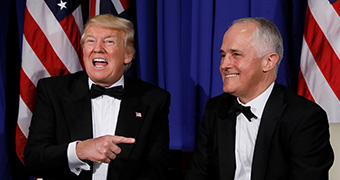Paying Tribute: Australia’s Prime Minister Malcolm Turnbull in the US

Vassals rarely question. If they do, criticism is limited and usually restrained behind closed doors. The Australian Prime Minister’s visit to Washington during February was marked by the usual and expected kowtows, blessings and awkward acceptances.
The visit was also marked by what an Australian media outlet claimed was “Australia’s most significant delegation ever to visit the United States to build trade connections with US governors.” Keeping Malcolm Turnbull company were four state premiers wishing to wade into the spectacle.
Trade Minister Steve Ciobo was glowing at the efforts of Australia’s ambassador to the US, Joe Hockey. The latter, he claimed, had been prancing before the National Governors’ Association in an effort to focus interest on Washington’s antipodean satrap.
“All governors of all the states come together in the United States to talk about their pathway forward, to build linkages… we’ll put a strong focus on our trade and investment relationship.”
The visit left nobody in any doubt about what would happen should the US find itself in yet another conflict. Australia, with unquestioning, conditioned automatism, would rush to the side of its imperial sponsor.
At the press conference of February 24 for the two leaders, President Donald Trump did a bit of buttering up.
“The United States and Australia are currently honouring the 100 years of mateship. The term that you use very beautifully, Prime Minister.”
Mateship, in the Australian sense, is a rubbery term, one of such elasticity it loses form when confronted. Do mates turn over the furniture of another’s house, cajole and hector? Is acceptable servitude a function of mateship? The failure of “mateship” to make its incorrigibly vague way into the preamble of Australia’s dry Constitutional document was a moment to celebrate.
Trump, however, was on form. As he does so often, he personalised the political. At the press gathering were Australians Greg Norman and billionaire Anthony Pratt, both of whom were asked to stand up by the president. The latter was singled out for his $2 billion investment in box making factories in the US.
“But he only did that if Trump won the election, I think, is that the correct statement Anthony?”
Pratt expressed due agreement, having previously proclaimed an inevitable renaissance in the US economy: “100 percent correct!”
Trump had other offerings. The Imperial Chief was proving generous.
“This afternoon, I’m pleased to announce that the United States will name the Littoral Combat Ship 30 the USS Canberra in honour of an Australian cruiser lost fighting alongside the US Navy during World War II.”
Such offerings do come at a price. Turnbull was thanked by the same figure who has, at various stages, threatened North Korea with annihilation. The deployment of Australian forces as pro-US dots of global engagement, including Afghanistan and forces marshalled against ISIS, was duly mentioned. Trump was also grateful for the prime minister’s “strong voice for peace and stability across the entire Indo-Pacific region,” a less than subtle hint that the vassal was doing its appropriate policing for Mother Empire.
Trump was also mindful of Canberra’s role in his coarse policy towards North Korea. “Australia is one of our closest partners in our campaign of maximum pressure to denuclearise the Korean Peninsula.” No sign there of sober counsel, a point then shown by Trump’s call that the US and Australia “must continue to stand together to prevent that brutal dictatorship from threatening the world with nuclear devastation.”
When it came to Turnbull’s turn to make a few remarks, the satrap’s obedience was clear. Closeness was stressed, the sort expected in disorienting infatuation. Indeed, matters in terms of the security alliance kept pushing both Washington and Canberra closer, a sort of cementing embrace. “The cooperation is more intense than it has ever been. Whether we are standing up for freedom’s cause in the Middle East, in our region around the world combating terrorism.”
The trip also marked the tired, forced iteration of that tried, and failed experiment: tax cuts for the mighty non-personality known as the corporation. In Turnbull’s words at the press gathering,
“We have secured some tax reforms in terms of reducing company tax but not as much as we need to do.”
The Australian government had been “inspired… by your success in securing the passage of the tax reforms through the Congress.”
Having learned nothing from such voodoo economics as “trickle down”, figures such as Turnbull and Trump have decided that corporations are heart and soul of a nation, while the rest can stand aside. The economic show room is only big for so many, and citizens do not count.
Despite an initially awkward start to the relationship, it is clear that Turnbull has found the customary niche all Australian prime ministers eventually do with the United States, firmly wedged in the machinery and bosom of empire, with its follies, miscalculations and limitations.
*
Dr. Binoy Kampmark was a Commonwealth Scholar at Selwyn College, Cambridge. He lectures at RMIT University, Melbourne. Email: [email protected]

